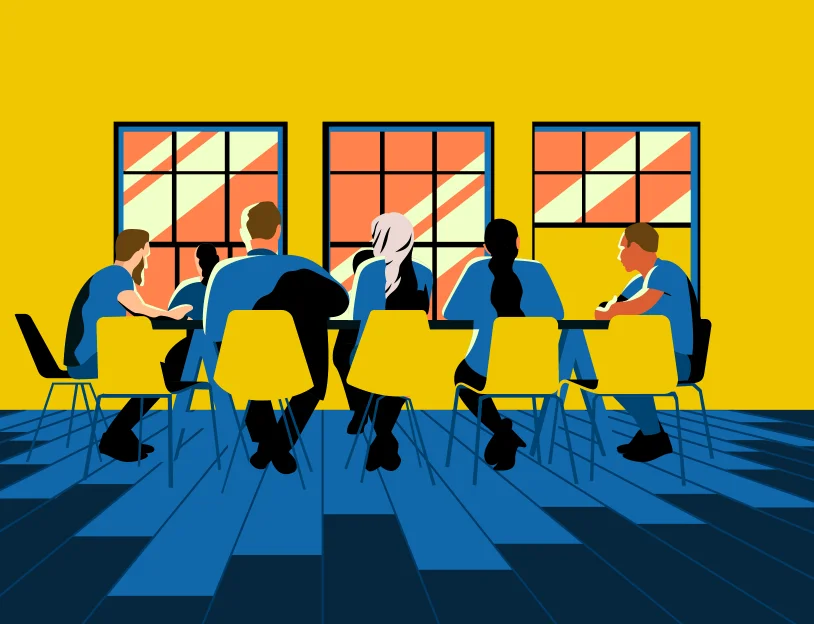Animated icons representing emotions are color-coded by SEL experts to represent emotion intensity level and how pleasant the emotion is. Teachers can see the types of emotions their students say they’re experiencing and can determine which students may need additional attention.
Know what your students are feeling
A friendly way for kids to share things that might be hard to talk about.
Emotional check-ins
Whether students are in class, hybrid or fully remote, Edsby now gives teachers a quick and easy way to poll students at the beginning of their day, or throughout the day, on how they’re feeling.
Age-appropriate selections
Younger students don’t have the same emotion vocabulary or skills as older ones. So Edsby presents emotion options to choose from that are tailored to students’ grade levels, accompanied by developmentally appropriate definitions. Suggested regulation strategies for each emotion, curated by experts, are also age appropriate.

Are your students ready to learn?
Find out what might be in the way of some students succeeding.

Specifically colored icons
Spot outliers or trends
Teachers see when there are new check-ins and can monitor patterns and trends over time. They also see if a student has opted not to check in, which is a student’s valid choice.
Recommendations for teachers
Teachers see what emotional regulation strategies have been presented to each student and receive their own professionally-curated strategies for educators based on what their students are feeling.
Confidential information
Edsby maintains students’ trust by keeping emotional check in information confidential between student and teacher.
Take action
Help make a difference in students’ well-being.
Facilitate conversations
Even in the absence of a formal SEL program, the Edsby Check-In system gives students and teachers a way to start a dialogue around emotions. Teachers and students can communicate and begin to build their emotion vocabulary literacy and their own personal toolkits of emotion regulation strategies to augment official SEL programs.
Loop in stakeholders
Edsby enables teachers to communicate privately with students and/or their parents, and/or guidance counsellors within the school’s same official, protected communications system.
360° view of students
In Edsby Check-Ins, a student’s Edsby Panorama is only ever a click away, including their comprehensive academic history, parent information, attendance records and more.
Ways to manage care
Students that might benefit from extra care can be grouped together for special educator attention. Edsby Monitor Groups, a long-established and appreciated feature of Edsby, can be set up as desired by teachers or guidance counsellors.

Research-based social and emotional guidance
Strategies informed by decades of SEL and emotion research.

Designed with academics
User interface, icon color, age-appropriate emotion selection and culturally responsive regulation strategy content in Edsby Check-Ins come courtesy of a team of academic advisors and an exclusive relationship with MindUP—an evidence-based non-profit program designed to improve children’s emotional well-being founded by actress Goldie Hawn. MindUP is aligned with current SEL research and is accredited by the Collaborative for Academic, Social, and Emotional Learning, or CASEL.


What our users say
I like being able to pull up Edsby on my iPhone. I'm glad our school chose your product. It's a great tool that's really evolved over the last 3 years.
Howard FishParent, Adelson Academy


What our users say
I'm a teacher who uses your anecdotal evidence of learning and gradebook! Amazing. All in one place! Love it!
Michael PearsonTeacher, York Region District School Board, 125,000 students and their parents on Edsby


What our users say
Now that I'm familiar with Edsby it has become a great tool for online learning.
Shannon SolinskiParent, Pembina Trails School Division


What our users say
It's an easy way to stay in contact with teachers, review grades and keep an eye on new homework or assignments.
Ericka VanderlaatParent, Hillsborough County Public Schools


What our users say
Edsby has been invaluable during our province’s 'Learn At Home' initiative. We're extremely pleased to have this virtual learning environment as we cover a vast geography. We can’t imagine where we’d be without Edsby right now.
Lucia ReeceDirector of Education, Algoma District School Board


What our users say
This tool has the ability to completely enhance the assessment quality within the classroom and how pieces are shared with families.
Abby LivingstonTeacher, Greater Essex County District School Board, 35,000 students and 4,500 staff on Edsby


What our users say
Edsby has revolutionized my classroom! I use it to communicate with students and parents. I feel Edsby helps my class become a real community.
Daniel ThorntonTeacher, Brooker Elementary School, Hillsborough County Public Schools


What our users say
I like being able to communicate in one place with families, message and share classroom posts as well as individual learning stories. And I like the new feature where I can see learning evidence below my report cards.
Leisa RookTeacher, Kawartha Pine Ridge District School Board, 34,000 students and 3,450 staff on Edsby


What our users say
Get Edsby and you'll be singing!
Laina AndrewsPrincipal, Cobourg Collegiate Institute East


What our users say
We're very pleased with how Edsby engages all members of our community, from administrators to teachers to students to parents.
Kevin SmithVice Principal of Instruction, King's Christian Collegiate


What our users say
I LOVE the one-stop shop for everything I need.
Jocelyn BlairTeacher, Greater Essex County District School Board, 35,000 students and 4,500 staff on Edsby


What our users say
We're excited about it and love it!
Krystyn EvoyGrade 4/5/6/7 Teacher, Superior-Greenstone District School Board
Edsby introduces social emotional check-ins for K-12 school districts and regions
Believing that LMS platforms should play an important role in student well-being, Edsby has introduced another key feature to further the social and emotional health of students.
Read moreEdsby wins THE Journal New Product Award for Social Emotional Learning
Edsby takes gold in the Social-Emotional Learning Program category of THE Journal 2021 New Product Awards.
Read moreAmidst the “learning loss” debate, Edsby prioritizes support for educators, students and families
Regardless whether learning loss is real, or even a fair term to begin with, here’s how the Edsby LMS for K-12 helps educators prioritize learning recovery and support.
Read moreHard SEL Questions Addressed
Two leaders of MindUP, the social and emotional learning (SEL) program from the Goldie Hawn Foundation, take on difficult SEL-related questions submitted in advance by K-12 educators, administrators and critics.
Read moreHow to talk about SEL with families
Get beyond the term itself, write Carl Hooker, Matt Joseph, Suzy Brooks and Leo Brehm of K12Leaders in an article on SmartBrief.
Read more






